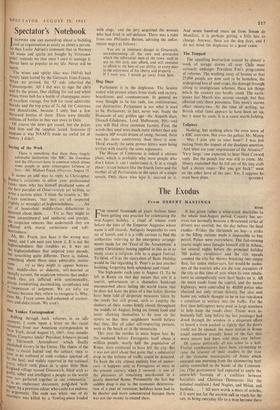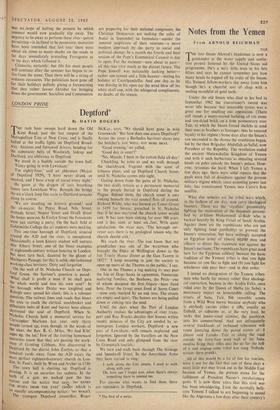The Exodus
From OSBERT HASTINGS
FOR several thousands of years Italians have been getting into practice for celebrating the mid-August holiday, a ritual of release even before the time of the Emperor Augustus whose name it still records. Antiquity bequeaths its own set of laurels and it is a trifle curious to find the authorities referring to the emergency arrange- ments made for the 'Feast of the Assumption,' a canny Christianity having applied in this as in so many cases a religious title to a pagan festival. To think of it as the equivalent of Bank Holiday would be like regarding St. Peter's as just another building, forgetting both splendour and ritual.
ROME
The high-point each year is August 15. To be left in Rome on that day means that one is a tourist, unfortunate or a shameless bankrupt unconcerned about letting the world know that he does not have the price of a bus ticket. Stories have been told of desperate measures taken by the needy but still proud, such as keeping the shutters of their rooms firmly closed throughout the middle of August, living on tinned food and never allowing themselves to be seen on the streets so that their neighbours would believe that they, like all other self-respecting persons, were at the beach or in the mountains.
This year the exodus in mass began late. By the weekend before Ferragosto itself about a million people, nearly half the population of Rome, were estimated to have left the city. But it was not until about that point that a substantial drop in the volume of traffic could be detected. To have the city almost entirely free of motor- cars--it happens only at Ferragosto or once in the present century when it snowed --is one of the pleasures of remaining unashamed in a nearly deserted Rome. Presumably the late but sudden drop is due to the economic determina- tion of a year of recession; holidays have had to be shorter and more concentrated because there was not the money to extend them. It has given rather a whip-crack discipline to the whole mid-August period. Country bus ser- vices ran normally because a threatened strike of drivers was averted; but the day before the final exodus--Friday the thirteenth no less—a strike at the filling stations made it impossible to buy petrol. Police were everywhere. The fast-moving tourist might have thought himself still in Athens, for several nights before the principal holiday 700 police, carabinieri and the riot squads combed the city for thieves breaking into empty flats, for stolen motor-cars, for would-be moles- ters of the tourists who are the true occupiers of the city at this time of year when its own inhabi- tants so compulsively turn their backs on it. All the main roads from the capital, and the motor highways, were controlled by 40,000 police who checked not only errant drivers, but also sent home any vehicle thought to be in too run-down a condition to venture into the traffic. For the first time helicopters were used in large numbers to help keep the roads clear. Trains were in- humanly full; long before the last passenger had dived through the window in a desperate effort to board a train packed so tightly that the doors could not be opened. the main station in Rome could somehow proudly boast of the fact that more tickets had been sold than ever before.
Of' course politically all has come to a halt. Fretful comMentators have been attempting to raise the interest of their readers in the case of the tiresome municipality of Aosta which emerged one morning from the shimmering heat safely reinstalled in the hands of the Commun- ists. (The government had expected to apply the centre-left formula of a coalition between Socialists and Christian Democrats like the national coalition.) And Naples, and Milan, and Sardinia ... ? All were worth a mass of articles. if it were not for the ancient call to reach for the sun, to bring everyday life to a stop because there Was no .,hope of halting the process by which summer would now gradually slip away. The urgency to be away to perform these rites—petrol permitting—is inclined to be possessive; motorists have been reminded that last year there were about six times as many deaths on the roads in the days immediately preceding Ferragosto as in the days which followed it.
Climactic, certainly; but life for most people will continue after the summer has begun to re- tire from the scene. Then there will be a string of arduous occasions. The politicians have gone off for their holidays politely giving a forewarning that they rather favour October for bringing down the government. Socialists and Communists are preparing for their national congresses; the Christian Democrats are seeking the calm of Assisi in September to formulate—amidst the amused scepticism of their veterans—a more modern approach by the party to social and political change. In a month the fourth and final session of the Pope's Ecumenical Council is due to open. For the moment—now about to pass— all this was very much in the distant future. The Pope himself was noticeably looking better— rather sun-tanned and a little heavier—during his holiday at Castelgandolfo. And one day as he was driving in his open car the wind blew off his white skull cap, with the whispered compliments, no doubt, of the season.































 Previous page
Previous page